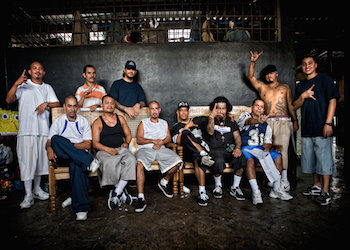Legislators in Guatemala have proposed a new bill aimed at attacking the country’s gangs by increasing fines and prison sentences for gang members. But how the draft law will be implemented and how effective it will be remains unclear.
The bill, proposed by Felipe Alejos and Juan Ramón Lau of Guatemala’s Todos political party, would punish those who join gangs and commit crimes with one to four years of jail time and a fine of between 20,000 and 35,000 quetzales (roughly between $2,700 and $4,700), Prensa Libre reported.
These penalties will triple for those who are found to have forced minors to join the gangs.
For gang leaders, however, the punishment is harsher. According to Prensa Libre, those who head the gangs’ operations would face a prison sentence of 10 to 15 years, as well as a 50,000 quetzal fine (about $6,800).
The bill would also punish those who “promote, finance and directly benefit” from the gang’s criminal structures with a 6 to 12-year prison sentence.
The proposed legislation would also prohibit guerilla groups, Prensa Libre reported.
InSight Crime Analysis
The new “anti-mara” bill, if written into law in Guatemala, may be very difficult to implement. The law may also not only fail to produce results, but could make a bad situation worse, as other similar policies have in the region.
Since the early 2000s, Central America’s Northern Triangle countries — El Salvador, Guatemala and Honduras — have relied on “iron fist” policies to combat the region’s criminal groups. In October 2006, for example, El Salvador initiated the Special Law Against Acts of Terrorism. And in 2016, legislators in El Salvador passed anti-gang measures that classified gangs as terrorist organizations.
However, these policies have been largely ineffective. Most recently, a report from the International Crisis Group highlighted the failure of such approaches in the Northern Triangle, and called for a “less repressive” approach to the gang problem in Central America.
SEE ALSO: Guatemala News and Profiles
The proposed bill in Guatemala has many similarities to the laws implemented in El Salvador, such as tougher prison sentences and treating the gangs as terrorists groups, La Hora reported. Zoel Franco, of the Institute of Comparative Studies in Criminal Sciences of Guatemala (Instituto de Estudios Comparados en Ciencias Penales de Guatemala – IECCPG) explained to Prensa Libre how El Salvador’s use of anti-gang laws should serve as a cautionary tale for Guatemala.
“The same people who proposed the law in El Salvador recognized that it had not been effective,” he said. “On the contrary, what was achieved was a restructuring of the gangs, perfecting their criminal activities.”
Furthermore, Edgar Celada, a security analyst at the Institute on National Problems at the University of San Carlos (Instituto de Problemas Nacionales de la Universidad de San Carlos – IPNUSAC) told La Hora that the bill was an “authoritarian” approach to the issue.
Crucially, there is still internal debate within the Guatemalan government about what constitutes a gang member, raising the question of what parameters would be used in arresting members of these criminal organizations. Arguably, this proposed bill is another flawed effort to criminalize a segment of the population that authorities and legislators are having a hard time identifying in the first place.
Difficulties with identifying gang members and far-reaching efforts to detain them may also further contribute to problems of overcrowding that have plagued Latin America’s prison systems. The region’s jails have become a “prime incubator” for organized crime, and it is probable that Guatemala’s proposed bill would feed that dynamic further by increasing the size of the prison population.

